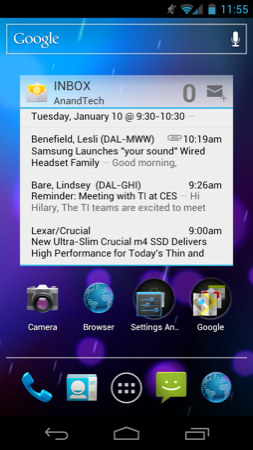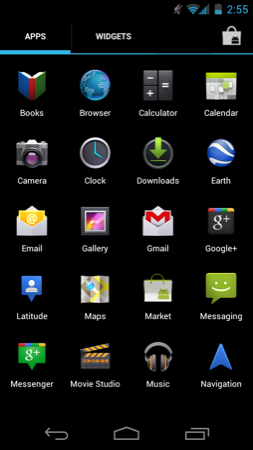Samsung Galaxy Nexus & Ice Cream Sandwich Review
by Brian Klug & Anand Lal Shimpi on January 18, 2012 1:34 PM ESTGoogle employs more than 20,000 people worldwide and the number of them working on Android are in the single digit percentage range. Google's business is search, but it has always had aspirations of more. Android isn't just a chance to capitalize on mobile search for Google, it's also an opportunity to grab power in the next era of personal computing. If you believe that smartphones will eventually replace mainstream PCs, who wouldn't want to be to smartphones what Microsoft was to PCs in the early 1990s?
Previous versions of Android have been cautious, evolutionary steps along a path to being a more open/flexible alternative to iOS. Starting with Honeycomb (Android 3.0) however, Google began to step out of the shadow of its competitors and really start to define Android as a mobile computing platform. Honeycomb was limited to tablets but its successor, Ice Cream Sandwich (Android 4.0), would bring unification to Android across both tablets and smartphones.
Today we look at both ICS and its launch vehicle, Google's Galaxy Nexus.
The Android vs. iOS Debate
It's very clear to me now more than ever that Apple and Google have completely different goals with their mobile OS strategies. Excluding the unclear strategy behind Chrome OS, Android is pretty much Google's primary operating system. The unified tablet/smartphone strategy behind Ice Cream Sandwich makes sense because for Google to succeed in the OS business it needs to deploy Android on everything from smartphones to notebooks. We've already seen the strengths in having a smartphone platform with a strong app ecosystem. Things become even more appealing if you have a phone, tablet and PC that all run the same OS and apps. As Android is Google's one-size-fits-all operating system, it needs to have a broader and slightly more ambitious focus than iOS otherwise it risks losing the race in the long run.
Apple is in a different position. It already has a successful desktop/notebook OS that is continuing to grow. While iOS has been a runaway success for Apple, the Mac OS X platform is a solid option for any user who needs more than their iPhone or iPad can provide. The two OSes may converge or at least borrow heavily from one another, but in the interim they can remain independent. If you need more of a computing experience Apple is happy to sell you a Mac. If you want the it-just-works appliance experience in your phone or tablet, Apple has a whole bunch of iPhone/iPad configurations to offer you.


ICS isn't a step towards iOS. If anything it proves that Google is committed to its own trajectory. Android is an OS that, although more closed than many would like, still allows more flexibility than iOS. You can sideload apps not purchased in the Market. The file system isn't completely hidden from you. You can even override the default zoom level on web pages. Apple and Google both pour tons of time and research into figuring out the best way to do something. And, to be honest, I feel like Apple generally does a better job of "getting it" for the very mainstream consumer. Rather than attempt to make the perfect mold however, Google gives you one that's a bit more flexible.
I've said this before but I do believe that Apple is trying to deliver more of an appliance experience, whereas Google is providing you with a modern take on a traditional computing experience. If the appliance is a smartphone, then both approaches are equally capable - it's just a matter of personal preference.
What's new in ICS really falls into one of three categories:
- Improvements in UI frame rate due to OpenGL ES rendering (non-skia) path
- UI tweaks
- New features
Nowhere in this list is a fundamental change in the way Android works. I feel that this is a very important point to understand and likely the cause for lots of disagreement when it comes to just how impressive (or not) ICS is.
ICS is smoother, more polished and has its own set of new features that make it a significant step forward for Android. What ICS is not however is an outright clone of iOS. If you prefer the iOS experience to Android, ICS will do nothing to change your opinion. If all you were missing from Android was a smoother UI, then its fourth major release should be almost everything you could ask for.










185 Comments
View All Comments
Jingato - Friday, January 20, 2012 - link
Why even bother posting a review of a phone that is over a month old? If you want to be a real news /review site you should of had a review the next day. There is no reason not to. period.get your shit together
tipoo - Friday, January 20, 2012 - link
Because they go more in depth than most reviews out there. The ones that post reviews the day after a product launch don't find nearly as many flaws and details as the AT team. There are plenty of other sites for quickie reviews, I like Anandtech for in-depth.Omid.M - Sunday, January 22, 2012 - link
That's unnecessarily harsh. If you're used to the same day "reviews" of Engadget--i.e. NOTHING technical, totally subjective measurements of everything, in the name of being the "first" with a review--then go ahead and keep reading Engadget.Brian and Anand review EVERYTHING in depth: basebands, screens, software, they even have supercurio who is well known dev in Android community for his take on audio processing. Plus, Anand and Brian were covering CES.
Anand, Brian,
Great job as always. I have a chance to pick up a Nexus LTE for $500 (since I don't have an upgrade) but will hold off; might go with iPhone 4S until Krait or iPhone 5 comes out and (hopefully) blows me away.
-Omid
@moids
Harbler - Sunday, January 22, 2012 - link
Why even bother posting a comment if you're not going to read the review? A cursory perusal of the index alone would have answered your question.Anand & Co. take the time required to turn in top-notch, in-depth reviews, and they've been doing it for longer than your favorite gadget review site has even been in business. Anandtech is, in every sense, a *real* review site.
If wholly subjective reviews of devices (provided within hours of launch) are your idea of informative reading, then please return to Engadget or whatever site you strayed from. Unlike Anadtech, sites of the sort you're looking for are a dime a dozen, and you'll find them substantially better suited to your attention span.
vortmax2 - Friday, January 20, 2012 - link
Can Brian or Anand comment on why they believe Samsung used an OMAP 4460 when they only clocked it to 4430 levels? Also, devs at XDA are having a hard time overclocking it to the 1.5GHz/384MHz max values. Any ideas? Thanks! -JamieTripp1717 - Friday, January 20, 2012 - link
Ive had it for over a month now and i upgraded from a galaxy s (epic 4g on Sprint). Watching Blue ray movies i put on my phone are simply amazing. Ive never seen anything better and i work in the electronics dept at sears. Its better than the samsung 7000 led screen. Overall it took a few weeks to really get used to Andriod 4.02 but it is an amazing improvment from 2.3.5. I cant think of too many flaws here. LTE is SOOO much fater than WiMax! i get about 25-30 MB/s when using speedtest. Upload speeds are very fast too, ave. is around 10ish MB/s. Battery life is fantastic compared to my epic 4g. At work i set my ohone to data restrict so i only get calls and texts because in my store there is NO signal at all and after 8 hours from 100% it will drop to 85%. My Epic wouldnt make it through the work day. 720p Super AMOLED+ really makes this phone a winner. Google and samsung working together is a great combo. My ONLY complaint is i wish i had an 8 or higher megapixel camera. But with the added features its pretty darn decent. No complaints except there are a few programs that are still not compatible with 4.0+ (HBOGO). I highly recomend this over any phone out or anything slated to come out for awhile anyways.Amit P - Friday, January 20, 2012 - link
I'm waiting for my THIRD Nexus to come in. I had screen problems with the first two. The screen wasn't as bright as my brothers Nexus with the same settings. The colors weren't as vivid either.Bristecom - Friday, January 20, 2012 - link
Thats why I didnt exchange mine. Even though it has a dead pixel, aside from that, the screen looks great. So I fear getting one with no dead pixels but poor brightness or colors. This screen is the best Ive ever seen. Other super AMOLED plus displays Ive seen have off colors that bother me.Bristecom - Friday, January 20, 2012 - link
I have to say, mine has a dead green subpixel and it is very clear to me even from a distance with green or white screens. Regardless, I didnt bother exchanging it. -Sent from my Galaxy Nexusmedi01 - Saturday, January 21, 2012 - link
A question, I have Galaxy S so can't compare.Could you please comment on whether black is actually black on Nexus as it is on Galaxy's?
I'm asking because dear objective Anand managed to make a photo of it that makes it look gray ("Display" page)